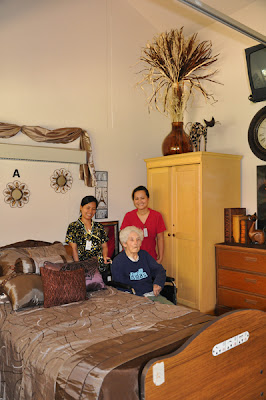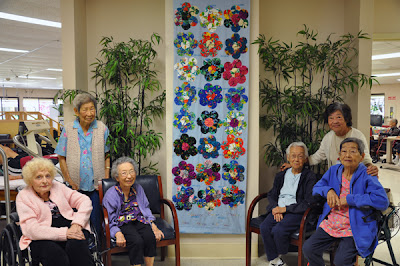 |
| Pictured from left: Jean Kaner, Ruth Fukamoto, Marion Watanabe, Masuyo Doi, Sue Dengler (volunteer), Lorraine Nishijo |
March 29, 2011
Adult Day Health Quilters
March 24, 2011
Visiting Alii Kula Lavender Farm
March 23, 2011
Understanding Care Partnership
When we begin to focus on Elders as people who continue to "grow and become," we open to what they have to offer us. Seeing Elders as mentors with something to give helps us make the leap from caregiving... to care partnering. When those usually described as care receivers learn they have something to give - and there is always some way that they can, no matter how subtle -and those usually described as care givers deeply acknowledge the ways that they receive from care receivers, some amazing shifts occur in the care dynamic. They become Care Partners."
Instead of seeing the needs of 'caregivers' as separate from the needs of 'care receivers,' we need to focus on the well-being of the whole care partnership. At the Eden Alternative, we firmly believe that words make worlds. Like the term 'Elder,' the phrase 'Care Partner' is an excellent example of the transformative power of choosing our language carefully. As a concept, care partnership evens the playing field, as it is often easy to get trapped in a one-dimensional experience of care. With this in mind, teams must fully appreciate what it means to be a care partner team. The term "care partner" should never be used simply as a politically-correct replacement for the words "staff" or "aide" or "caregiver/care receiver." Care partnership encompasses so much more, both in nursing homes and out in the larger community.
By our definition, a care partner team is composed of the following care partners: the Elder herself; those care partners who work with her, whether they work in a nursing home or through home health support; her family members, friends, volunteers, and any other health professionals that collaborate with her. Care partnering implies a balance of care, that opportunities to give as well as receive are abundant and experienced by everyone involved in the care relationship in every moment. To deepen the experience of care partnership, consider holding Learning Circles on the subject that bring Elders and all of their care partners together.
Source: Eden Alternative News & Updates
March 22, 2011
A Trip to the Aquarium
 |
| Nonna Yalon and Nonna Nicolas pose in front of the Maui Ocean Center |
Yesterday, Hale Makua Wailuku residents spent the afternoon at the Maui Ocean Center. They enjoyed all the wonderful sites, weather, and the great company!
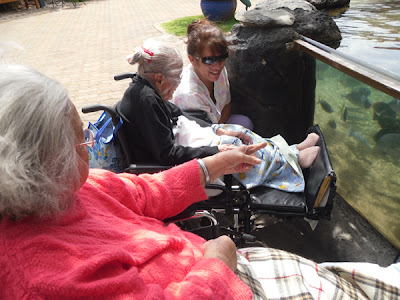 |
| Activities Assistant Delva with Nonna Nicolas and Nonna Yalon meeting some fish friends |
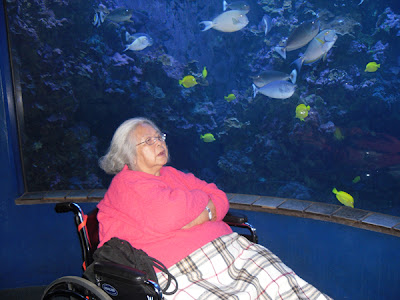 |
| Nonna Yalon inside the aquarium admiring the fishes |
Residents' Gardening Club Gets Going in Wailuku
At a recent resident council our elders decided that they wanted to plant a new garden at our Wailuku home. Elders, volunteers, families/friends, and staff have been meeting weekly as the “Garden Club” to discuss the plan of action. Recent topics included, a unanimous decision, on relocating the garden to the area adjacent to the sidewalk, where the red gingers are now. It was also agreed that an elevated garden would better address the issue of accessibility! Using existing planter boxes and requesting funds from the Office of Development and private donations were some of the good suggestions made!
Many mahalos to Kel Sato for his help with the Garden Club at Wailuku!
March 21, 2011
About the Eden Alternative Path to Mastery Milestone 1
The Path to Mastery: The Art of Creating a Caring Community is a new resource that the Eden Alternative has created to guide homes through the process of integrating the Ten Principles and practices of our Philosophy deep within their organization. It is based on 15 years of experience of homes that have committed to deep and lasting culture change. It contains four Milestones that mark off different levels of expertise attained as homes progress on their culture change journey. The accomplishment of Milestones will also inform consumers what to expect when they visit Eden Registry homes. The Path to Mastery is way to help those within the Eden Alternative community become well-known.
Milestone 1 contains the foundational steps that prepare formal leaders to guide the implementation of culture change. If you left Certified Eden Associate training wondering what to do next, Milestone 1 gives you the path to get started. Completing Milestone 1 is the path toward joining the Eden Registry; it is a part of the application process. All current homes on the Registry are also journeying back in time to remember just how they got started by completing the steps in Milestone 1. Whether they have been on the journey 2 months or 12 years, each story they share is filled with ideas on how you can get started as well. Once all the current Registered Home have completed Milestone 1, we will be bringing their stories together in a Registry Community Legacy that will inspire others to join us in creating a life worth living for all care partners everywhere.
Once an organization is on the Path to Mastery and has joined the Eden Registry, they will have access to the other three Milestones. These Milestones continue to guide homes through a series of outcome steps along a path that leads to deep culture change. There are many new tools and resources that have been developed specifically to support the Path to Mastery.
We are on schedule to submit the Path to Mastery Milestone 1 by April 1, 2011!
Tip of the Week: The Continuum of Care – What Does It Mean for Culture Change?
Culture change in our industry was born in the halls of the nursing home. For many years now, we have witnessed exciting developments regarding how we can transform the nursing homes of yesterday into the warm, welcoming homes of today. We have had the opportunity to benefit from a body of work that has been years in the making. When we talk about the “whole continuum of care,” we are referring to the undeniable fact that care doesn’t stop inside the walls of the nursing home. It reaches beyond those walls into the neighborhood streets and communities that make up our towns and cities. It reaches into the faith-based communities, the senior centers, the adult day centers, the assisted living and independent living communities, the hospitals, and the home health networks that support the needs of Elders in those towns and cities.
And in each of these environments, care does not live in a vacuum. The care experienced in the nursing home is connected to the care offered in the hospital or at home or in assisted living. Each impacts and influences the other. This is why culture change must reach across the entire continuum of care to be truly effective. We can’t push hard for change in nursing homes and simply ignore how the institutional model impacts care in someone’s home. When the general public is educated about culture change and person-directed care, we raise the bar of expectation. No one drives change better than a motivated consumer! But it is more than just teaching the public about what to demand from care at any level. It is also about empowering the public to own their role in changing the culture of care. How do they live these concepts in their own lives, in their own interactions, in their own care relationships? Quality care begins at the grassroots level. We are all part of the solution.
Two weeks ago, members of the Georgia Culture Change Network came together to acknowledge their varied roles on the continuum of care at Eden at Home Trainer Certification in Atlanta, Georgia. This particular culture change coalition is committed to addressing care as a continuum, and given their creativity and enthusiasm, we have no doubt they will achieve great things. May their commitment be a reminder – it can be different, no matter where Elders live!
March 17, 2011
Saint Patrick's Day Festivities
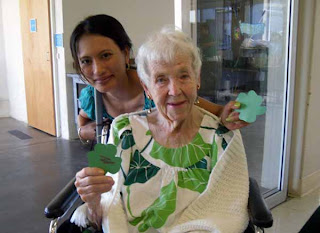 |
| Mrs. Keegan and Mona counting their lucky shamrocks |
Today we had our Lucky Shamrock hunt. Residents and staff paired up and raced through the hallways to be the top 2 teams to collect the most Lucky Shamrocks for prizes. After the shamrock hunt we enjoyed a Luck o the Irish Ice Cream social and card tournament.
 |
| And their off! |
 |
| Teams racing through the halls to get back and count their luck! |
March 2, 2011
West Neigborhood Resident Room Gets Redecorated
 |
| From left: Jules Castillo, Fedelyn Domingo, Ella Rosetes, Leilani Goo, Evelyn Wilson, Chris Casio |
This past Monday, West Neighborhood resident Evelyn Wilson and her team of care partners (Chris Casio, Jules Castillo, Fedelyn Domingo, Leilani Goo and Ella Rosetes) helped redecorate her room to feel more home-like, and personalized to her own tastes. Originally from England, the team created a room with a European feel. Activities Director Teresa Lopes and Nutrition Services Manager Rosie Kahiamoe assisted with the shopping.
Next the team is planning on work with Evelyn's roommate to revamp her room!
Subscribe to:
Posts (Atom)



